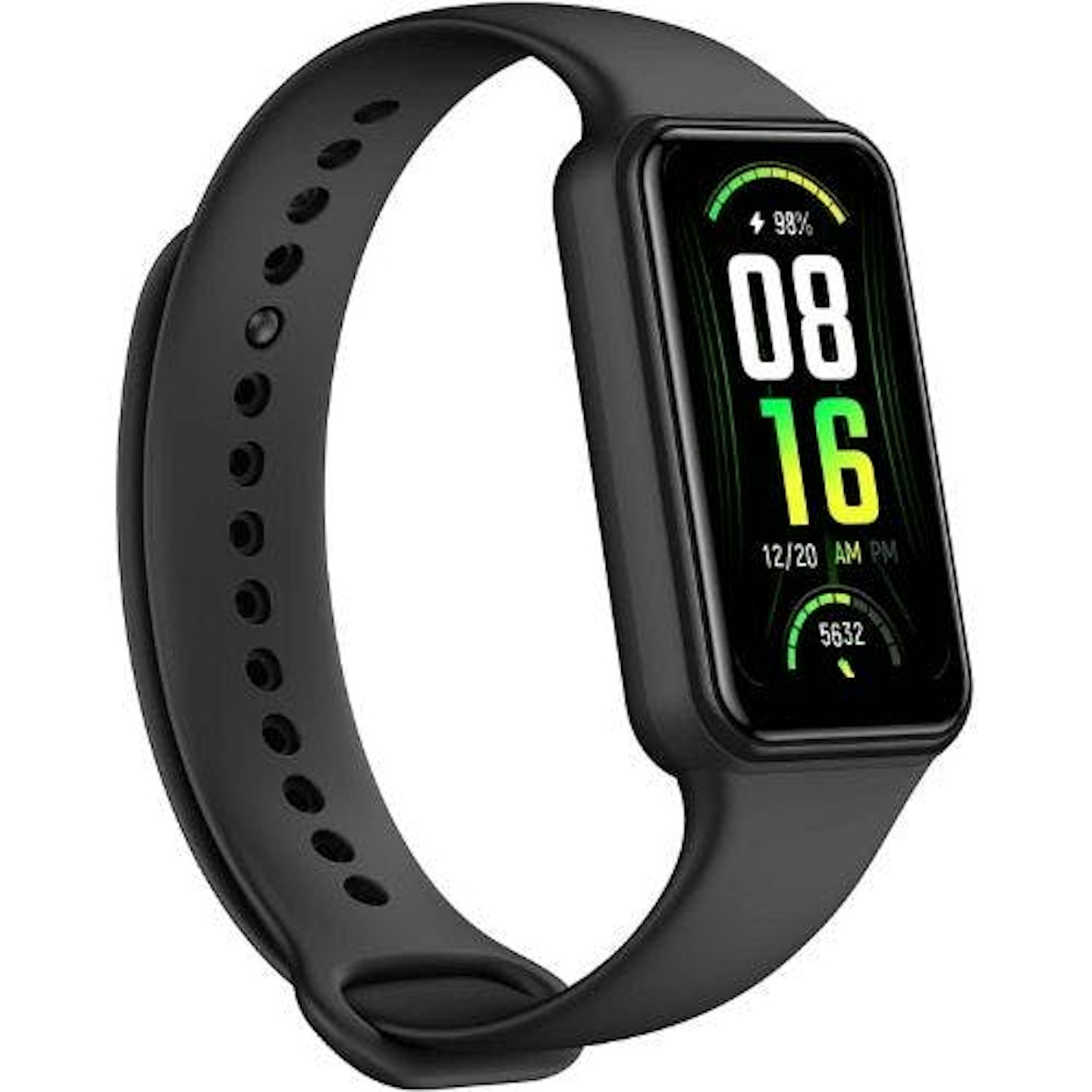The most telling thing about the success of fitness trackers is that we’ve stopped calling them ‘trackers’ and mostly just call them ‘my watch’.
Sleek, affordable and capable of integrating with other devices and platforms to dazzling effect, fitness trackers strive to be your motivational buddy, your step counter, your coach and your cheerleader.
Compared to the pithy digital watch of only a few years ago, the fitness tracker is a wonder. Depending on specification, they can command your phone to play music through your headphones, set and adjust your fitness goals, monitor your sleep patterns and read your messages.
Our shortlist
Fitbit Charge 5 – Best in Test
Amazfit Band 7 – Best Value
Garmin Vivosmart 5 – Best for ruggedness
Huawei Band 8 – Best for simplicity
Sales soared over lockdowns as we yearned for fitness and freedom. Now they’re as much a part of life as posh coffee or a streaming binge. Truth be told, they’ve all reached a fairly standardised level of reliability now, so it’s mostly a matter of price, specification, aesthetics and connectivity.
We’ve taken the industry's front runners and looked at what they offer, and how well they cater to a trail runner's needs.
The best fitness trackers in detail:
Best in Test
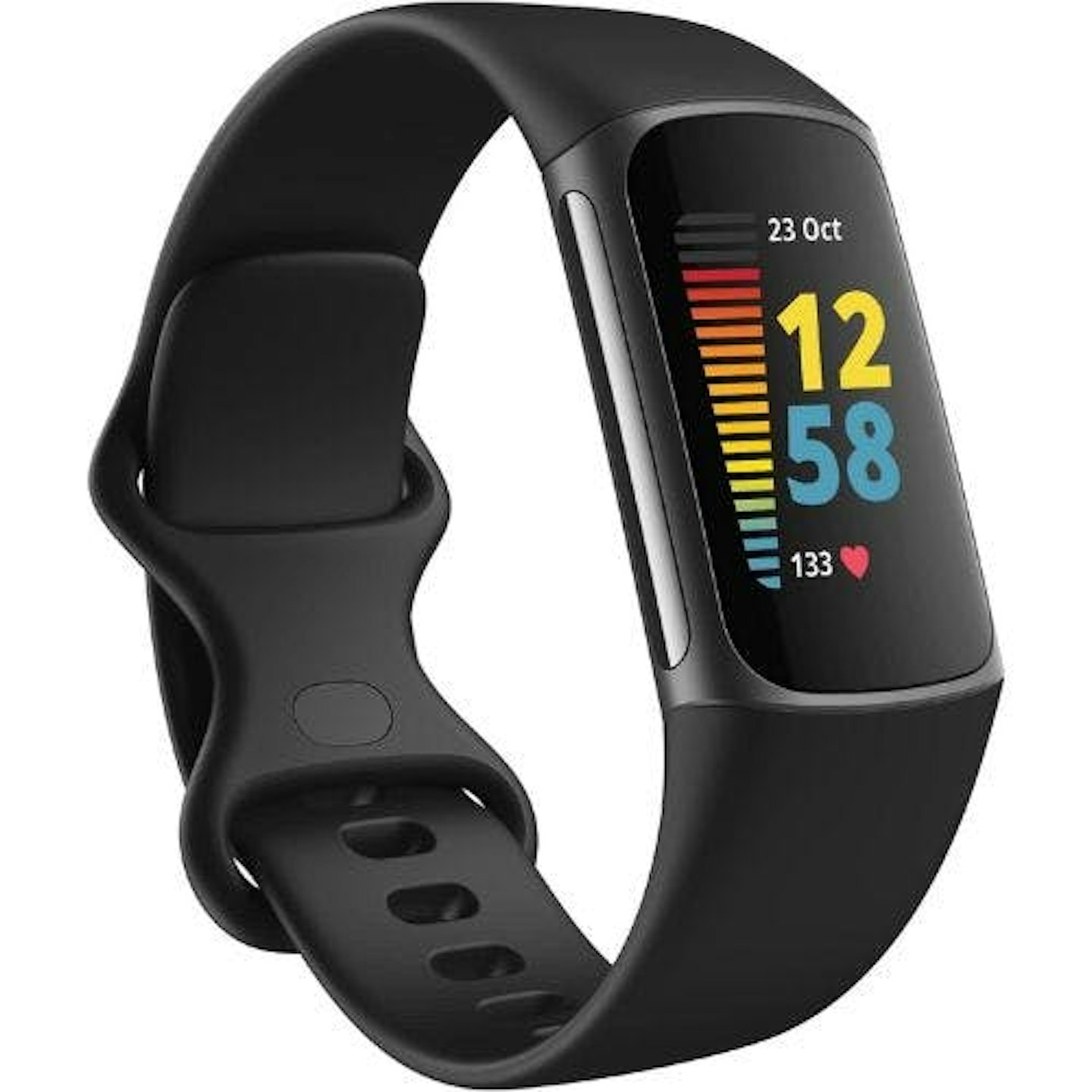
True, the Charge 5 isn't the latest Fitbit. The Charge 6 has more Google-oriented changes (like Google Wallet instead of Fitbit pay). But it's not like the Charge 5 is suddenly obsolete. If anything, a new model makes the Charge 5 even more attractive thanks to a price drop.
Fitbit nailed the art and science of the friendly, encouraging, motivational tracker years ago, and they still remain the perfect choice for those looking to combine fitness and lifestyle functions in one smooth, beautiful package. We still find the Charge 5 tracker is no exception: sleek, lovely to touch, easy to use, and as friendly and ego-boosting as you want it to be (it’s often referred to as a ‘gym buddy’ but don’t let that put you off).
The stainless steel casing is tough, the screen is big and the graphics are bright and clear even in full sunlight. But the big benefit is inbuilt GPS, meaning you get position location and route tracking as standard, while the presentation of your routes, steps, miles and stats on the Fitbit app is near flawless.
It also offers heart rate monitoring, sleep tracking, phone notifications, contactless payment and menstrual cycle tracking. The screen has an ‘always on’ function, and a fully charged battery should last you seven days (slightly less if there’s a long walk each day, of course).
Operation is entirely via touchscreen (no buttons), but this has never caused us an issue even in the worst weather, amazingly. The American style chivvying (“go you!”) may not suit all tastes, but it’s Fitbit’s stock in trade so at least you know what’s coming. It’s not really big news for us to say it, but this is the one that gets everything right.
Pros
- Up to 7 days of battery
- Water-resistant
- Even better value since the release of the Charge 6
Cons
- The “keep it up!” messages can be irritating
| Weight | 28g |
| Battery Life | 7 days, or 5 hours continuous GPS use |
| Waterproof | Yes |
| App Compatibility | Fitbit, Strava, Relive |
Best Value
Amazfit specialises in high-spec devices at bargain bin prices. The Band 7 easily rivals the functionality of the better-known names in this test with a full suite of services, including a heart rate sensor, blood oxygen reading, sleep tracking and Amazon Alexa control, and it connects to a straightforward monitoring app called Zepp.
We found it’s simple enough to start an activity tracking session, but there are some flaws. The long, lean face sits flat over the wrist and feels bulky. Slicker rivals curve slightly for comfort and stability, and there is no ‘always on’ option, and the raise-to-wake and tap-to-wake functions are a bit hit and miss. Also, the touchscreen becomes sluggish in cold, wet weather, and there’s no button for backup like you get on the Garmin.
But battery life is very good. It claims to last 18 days between charges (a lot more than the Fitbit or Garmin). Although that does drop if you track activities every day. While there are some rough edges, you get an awful lot for your money with this.
Pros
- Great value
- Long battery life
- Amazon Alexa built-in
Cons
- Lacks quality of more expensive rivals
| Weight | 28g |
| Battery Life | 18 days |
| Waterproof | Yes |
| App Compatibility | Zepp, Strava, Relive |
Best for ruggedness
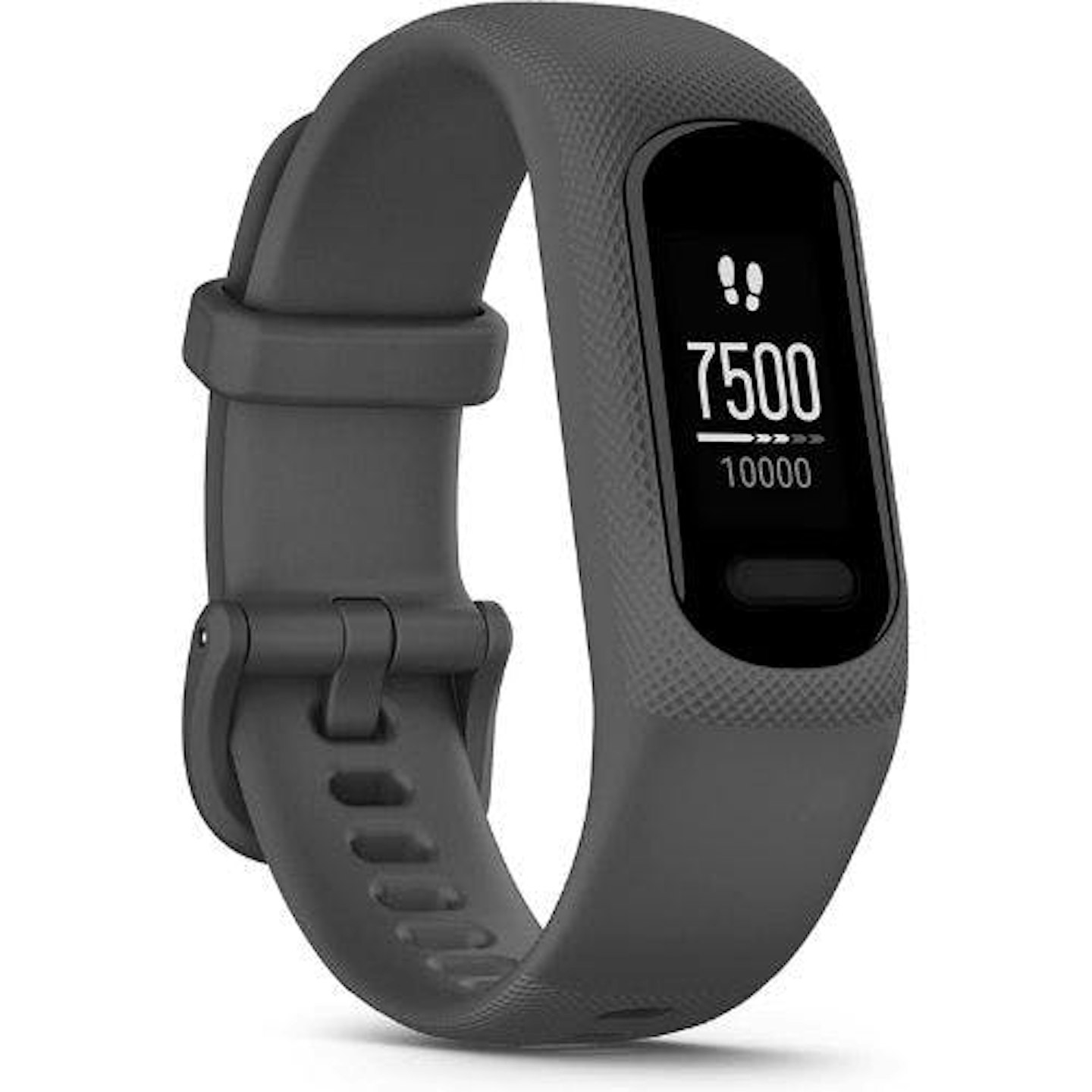
From the off, the Vivosmart 5 felt more dedicated to rugged outdoor use than its peers, thanks to its ergonomic design and tough-yet-flexible silicone sheath. To improve ease of use, the Vivosmart 5 has a much larger screen than its predecessor, the Vivosmart 4.
Garmin markets this as a fitness tracker that’s ideal for newbies because it’s so easy to use. Indeed, Garmin has done well here. There are plenty of functions on the Vivosmart 5, such as built-in sports apps, but it’s all reasonably intuitive. There’s no built-in GPS, but it will connect to your smartphone’s GPS and you can track your activities that way. Beyond this, you get all your basic step, mileage, calorie and sleep stats when synced to the Garmin Connect app, which is fussy but thorough.
Like the Fitbit Charge 5, there are plenty of highly enthusiastic, motivational messages that pop up. Depending on the type of person you are, this can be marginally irritating. This is a button and touchscreen operated device. It has a rechargeable battery that offers up to a week of run time, depending on how you use it.
Pros
- Tough
- Feature-rich
- Easy to use
Cons
- Slightly fussy app
| Weight | 26.5g |
| Battery Life | Up to 7 days |
| Waterproof | Yes |
| App Compatibility | Garmin Connect, Strava, MyFitnessPal |
Best for simplicity
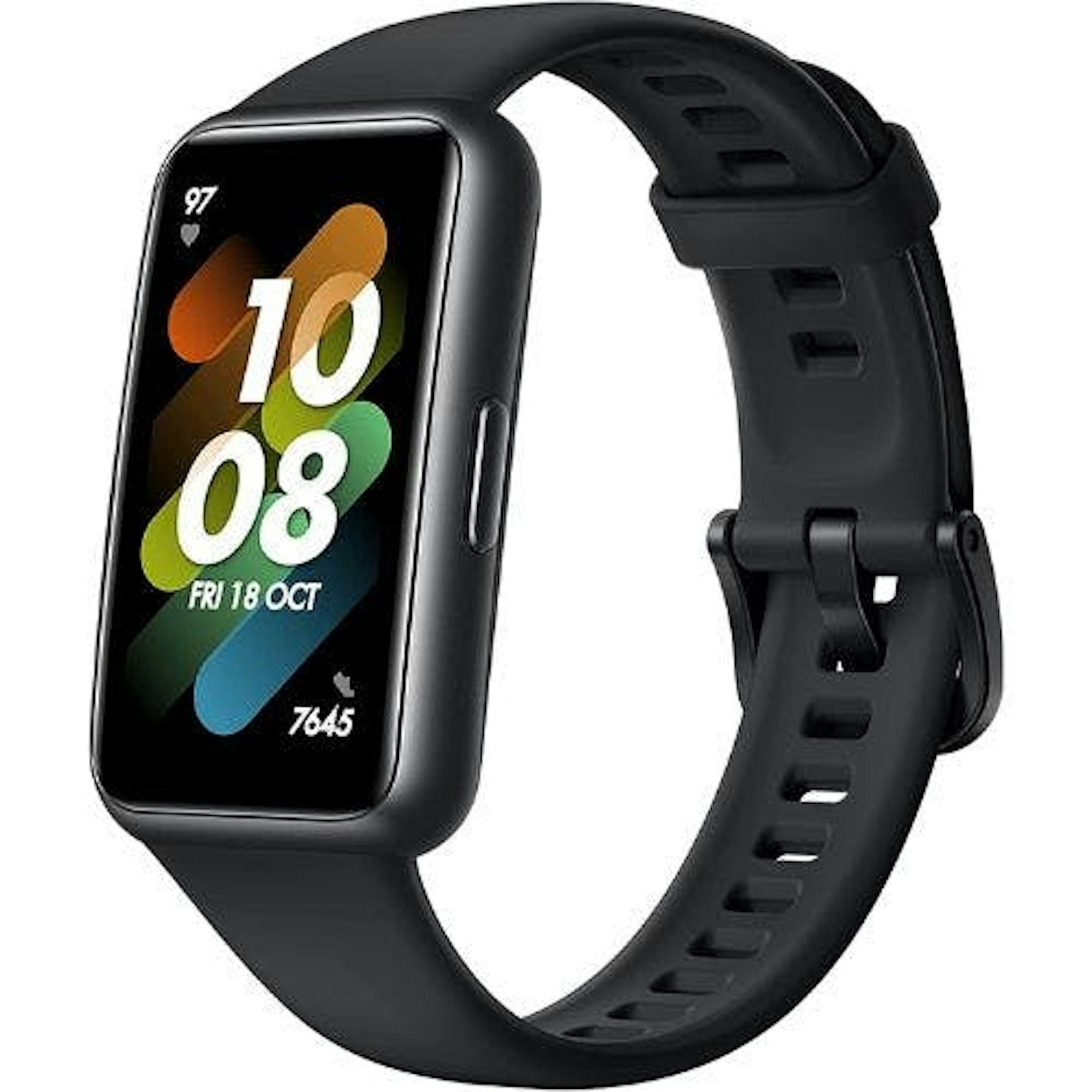
There’s plenty to like about the Huawei Band 8. It’s clear, straightforward, accurate and fun, with a large, bright screen and plenty of connectivity. But it kind of falls between the benchmarks set by the products around it. The Band 8 looks like the Fitbit Charge but there’s no GPS. It tracks runs accurately but the polymer composition doesn’t feel as sturdy and flexible as the Garmin.
So it’s a good product in itself, especially considering the price, but somewhat struggling in context. The interface is a mix of touchscreen and a single side button, and it’s simple enough to cycle through menus, start an activity or go back to the home screen (although resetting the menus to your own preference is fiddly). Battery life is an decent two weeks, if you don't use the sleep tracker. Otherwise it dips to 7-9 days.
We liked its autodetection: it senses when you’ve started an activity and tracks it accordingly. Plus you can customise the home screen to the point of adding a treasured photo to it. But although it’s a good product by most yardsticks, if we’re coming back to the simple question of how good it is for runners, the answer is so-so. It's relatively simple activity tracking works quite well but depending on your priorities, others can do things better.
Pros
- Good lifestyle functions
- Accurate
- Easy and intuitive to use
Cons
- No GPS
- Feels a bit fragile
| Weight | 14g (not including strap) |
| Battery life | 9 days’ typical use |
| Waterproof | Yes |
| App compatibility | Strava |
Best featrues
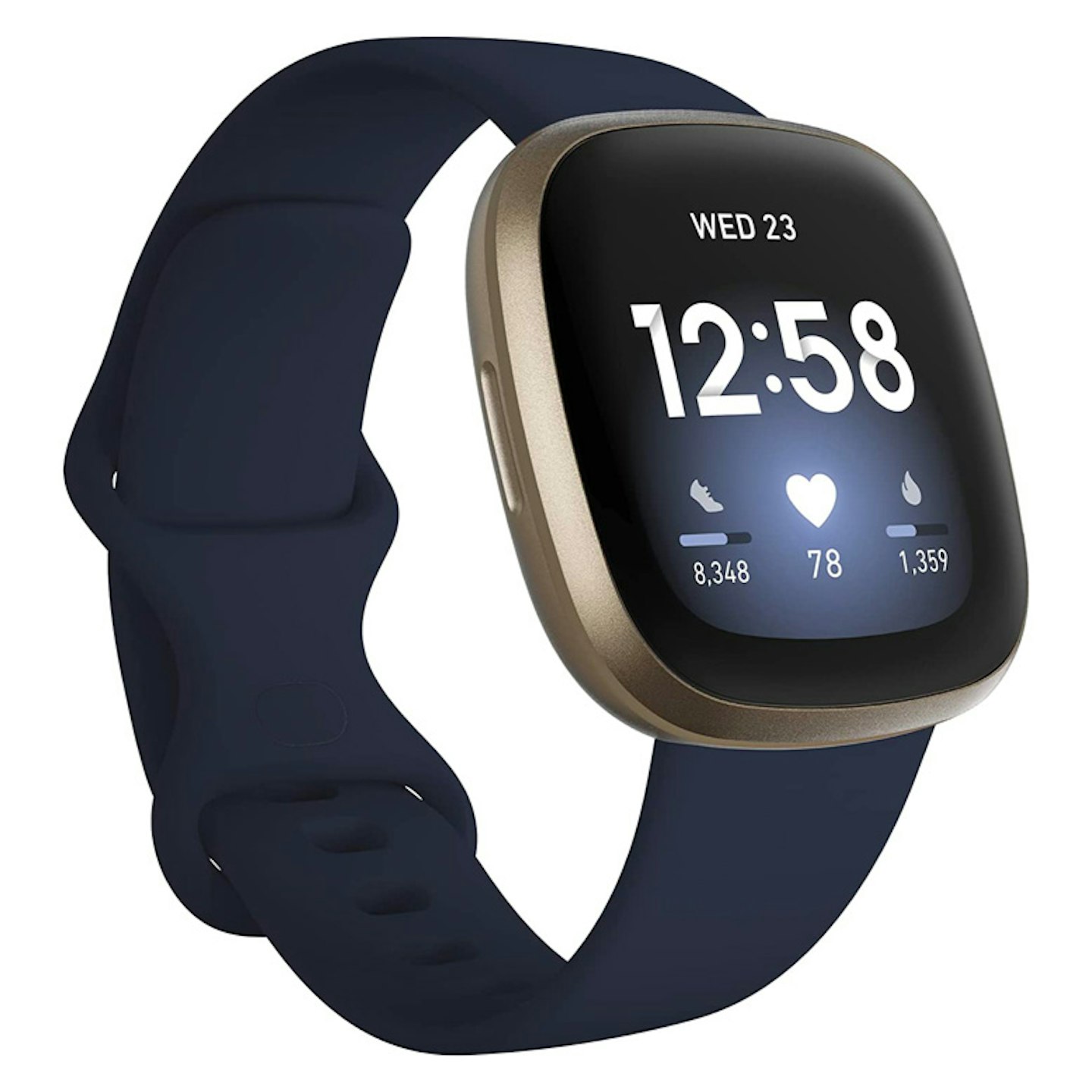
A Fitbit favourite, the Fitbit Versa 3 is one of those comprehensive fitness trackers you know will deliver. We've been using ours for well over a year now and it remains as sleek and responsive as the day we got it. The Versa 3 is an affordable and stylish fitness tracker watch, which has a huge range of handy features. Most importantly, it's hugely intuitive, which we love.
The built-in heart rate monitor and SpO2 sensor provide comprehensive health tracking, while the GPS allows accurate outdoor activity tracking. The Versa 3 supports 24/7 activity tracking, sleep monitoring, and guided breathing exercises.
With over 20 exercise modes and personalized on-screen workouts, it caters to various fitness goals. It also features built-in Amazon Alexa and Google Assistant for voice commands and notifications. Importantly, the Versa 3 boasts a long battery life of up to six days and supports contactless payments through Fitbit Pay (trust us, you'll be happy about this during your long runs).
However, if you're an avid sportsperson and want to go down the smartwatch route, consider saving a bit longer and getting noticeably tougher and fully featured like the Garmin Instinct 2.
Pros
- Huge array of health and wellbeing features
- Good battery life
- Mix of sport and lifestyle features
- Something between fitness tracker and smartwatch
Cons
- Not as tough as some other outdoor smartwatches
| Weight | 40g |
| Battery life | 6 days' typical use |
| Waterproof | Yes |
| App compatibility | Fitbit, Strava, Relive |
Highly recommended
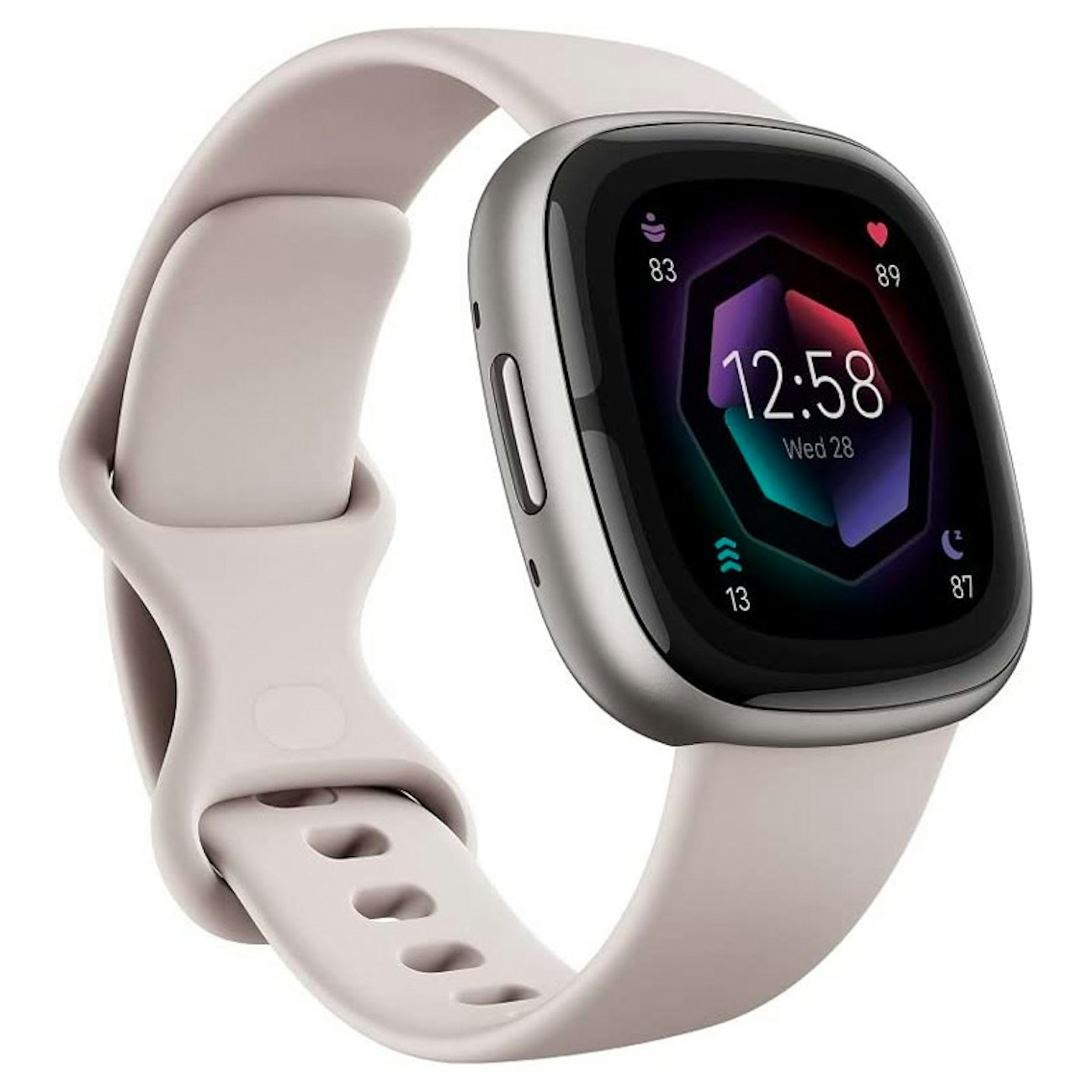
The Fitbit Sense 2 joins a long line of popular fitness trackers from Fitbit. It's got all the mod-cons you'd expect from a wellness tracker. Key features include heart rate monitoring, GPS for activity tracking, the ability to take on-wrist calls and texts, and more. One such feature we particularly like is the all-day stress detection and stress management score, and the menstrual tracking for women.
All this data is compiled onto a health metrics dashboard so you can keep track of the ebb and flow of your daily wellbeing. Like the Versa 3, the sense 2 also claims a decent six plus days of battery life and offers a free six-month premium membership for further insights and health guidance from Fitbit.
Pros
- Good wellbeing tracking features
- Great battery
- Comes with 6-month premium membership
Cons
- Less affordable than comparable options
| Weight | 40g |
| Battery life | 6 days' typical use |
| Waterproof | Yes |
| App compatibility | Fitbit, Strava, Relive |
Key features to look for in a fitness tracker
GPS: Not many fitness trackers come with built-in GPS. It's a real bonus point if they do. Some can offer GPS tracking via smartphone connectivity as an alternative.
App connectivity: Fitness trackers have their own-brand apps, but you'll also want to check if you can also integrate other fitness apps too, such as Strava.
Battery life: The longer the better, naturally. When brands give an average battery life figure, it pays to check what the criteria are because it's often a very optimistic result.
Waterproofing: The standard waterproofing for fitness trackers is water resistant down to 50 metres (5ATM). But some vary, so it's a feature to check.
Screen size: There's a balance to be had here. Bigger screens offer better ease of use, but too big and the fitness tracker becomes bulky. This is subjective thing, because peoples' wrists are different sizes.
Toughness: This largely relates to the materials used. For example, a silicone strap offers better flexibility and therefore durability and longevity than a TPU one.
